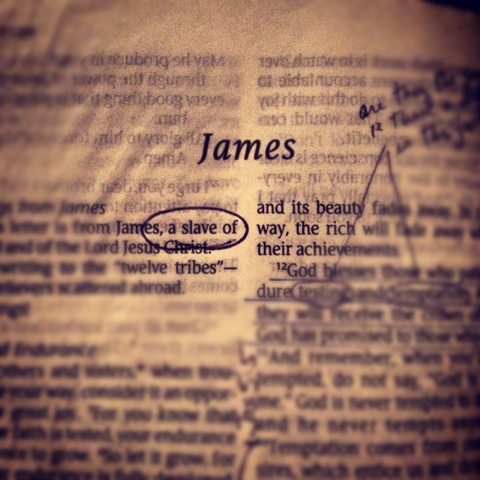If we could only live out this one little chapter in this one little book.
Frankly, if we could all live out the first half of the first sentence, everything else would fall in place.
James 1:1 (NKJV) James, a bondservant of God and of the Lord Jesus Christ…
I’ve always been intrigued by James’ identification of himself. Bondservant. We know him as Jesus’ half-brother – the son of Joseph and Mary. He was also the cousin of John the Baptist – another great name in his generation. I’ll tell you, I would have probably done a little name dropping, if I were James….
Yet James identifies himself as a “bondservant.” So what does that really mean?
Strong’s Concordance defines it to mean the following:
- a slave, one who gives himself up to another’s will
- devoted to another to the disregard of one’s own interests
The idea here is not a slave like we understand of pre-Civil War America – where human beings were forced or born into bondage and regarded as owned property to be bought, sold, used, abused, or traded as their owner saw fit. The idea here is a voluntary stepping into servant-hood out of devotion and relationship.
This completely describes Christ’s life on earth. Jesus gave himself up to another’s (his Father’s) will – to the point of death (Philippians 2:8). Jesus was totally devoted to his Father to the disregard of his own interests, his own desires, his own wants, his own image. He didn’t care what people thought, or said, or did toward him. He was completely and utterly walking in God’s hands. After all, Jesus did what his Father did (John 5:19) and said what his Father said (John 12:49).
Jesus voluntarily stepped into servant-hood out of devotion and relationship to God, his Father – to the disregard of his own interests.
James voluntarily stepped into servant-hood out of devotion and relationship to Jesus and God – to the disregard of his own interests.
So the question begs itself…. How do I identify myself?
The question goes deeper than it seems on initial glance. Not only does this imply how I identify myself to others, but how do I really identify myself to myself?
Do I give up to another’s will? Am I so devoted to my Lord? Does it show in how I treat – or should I say serve – my wife and family? After all, Ephesians says I’m to love my wife like Christ loved the Church – for whom Jesus died.
It all comes back to complete humility. If you’ve read many of my posts, you know I often end up here… Galatians 2:20. Dying to self as an act of my will.
Discuss: How does it affect mine and the lives around me to accurately identify myself as a bondservant? How do I do that?
Leave a comment.
Running After Papa…
